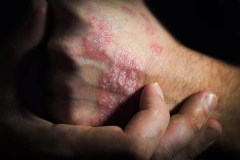
Dr Sancy Leachman: Melanoma Metastasizes Quickly, Needs to Be Caught Early
While melanoma is one of the most aggressive cancers, making early detection crucial for outcomes, because it is visible on the surface, there are opportunities to catch it early, said Sancy Leachman, MD, PhD, professor and chair in the Department of Dermatology and director of the Melanoma Research Program at the Knight Cancer Institute at Oregon Health and Science University.
This content was produced independently by The American Journal of Managed Care® and is not endorsed by the American Academy of Dermatology.
While melanoma is one of the most aggressive cancers, making early detection crucial for outcomes, because it is visible on the surface, there are opportunities to catch it early, said Sancy Leachman, MD, PhD, professor and chair in the Department of Dermatology and director of the Melanoma Research Program at the Knight Cancer Institute at Oregon Health and Science University.
Leachman presented on an early detection program in Oregon, as well as germline genetic testing for patients at risk of developing melanoma, at the annual meeting of the American Academy of Dermatology.
Transcript
Melanoma is a particularly aggressive cancer that spreads fast. Can you explain the importance of early detection?
There are a couple of features about melanoma that make it really sort of the poster child of early detection, if you want to call it that. First of all, it's on the skin surface—the vast, vast majority of melanomas you can see with your own eyes, you can tell that it's there. And so, if you're paying attention, it's an opportunity for early detection. It's not like a cancer that's on the inside where you can't really see it, and you would never know it's there. With melanoma, if you're paying attention, you got a chance to catch it.
The question is then, are you going to catch it early enough? And the problem with melanoma, is it's probably one of the most aggressive cancers in man, if you think about how soon something starts to metastasize to the rest of your body. Melanoma will start to metastasize when it's only a millimeter thick. In comparison, if you look at the data, for example, and compare between melanoma and breast cancer survival rates: the 5-year survival rates for melanoma at 1 millimeter, are about the same as the survival rates for breast cancer at 2 centimeters.
You really do need to catch it early, but because it's on the surface of the skin, you can see it—you can usually see it—to be able to do that if you're paying attention. So, there’s an opportunity for education.
Newsletter
Stay ahead of policy, cost, and value—subscribe to AJMC for expert insights at the intersection of clinical care and health economics.




































































